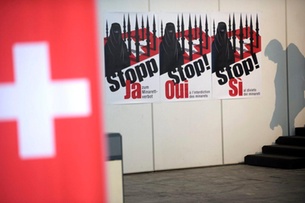The country voted narrowly in 2009 to ban the building of minarets. (Keystone) Switzerland should take steps to ensure that people’s initiatives do not contravene international law, the United Nations Human Rights Committee says. It notably called for the repeal of a Swiss vote banning the construction of minarets. The recommendations, released Thursday, came after the fourth periodic review of Switzerland by the members of the UN Human Rights Committeeexternal link earlier in July. Though broadly positive, the 18-member panel found that several people’s initiatives in recent years conflicted with Swiss obligations as a signatory of the International Covenant on Civil and Political Rights. As well as voicing concern
Topics:
Swissinfo.ch considers the following as important: Featured, newsletter, Politics, Swiss Markets and News
This could be interesting, too:
Investec writes The Swiss houses that must be demolished
Claudio Grass writes The Case Against Fordism
Nachrichten Ticker - www.finanzen.ch writes Die Performance der Kryptowährungen in KW 9: Das hat sich bei Bitcoin, Ether & Co. getan
Nachrichten Ticker - www.finanzen.ch writes Wer verbirgt sich hinter der Ethereum-Technologie?
Switzerland should take steps to ensure that people’s initiatives do not contravene international law, the United Nations Human Rights Committee says. It notably called for the repeal of a Swiss vote banning the construction of minarets.
The recommendations, released Thursday, came after the fourth periodic review of Switzerland by the members of the UN Human Rights Committeeexternal link earlier in July.
Though broadly positive, the 18-member panel found that several people’s initiatives in recent years conflicted with Swiss obligations as a signatory of the International Covenant on Civil and Political Rights.
As well as voicing concern about the proposed “auto-determination initiative” – which would place Swiss law above international law – the final report notably criticised the prohibition of minaret construction in Switzerland, voted in 2009.
“The banning of minarets should be repealed”, said the committee vice-president Yuval Shany, speaking to journalists in Geneva.
However, beyond revoking the relevant article of the Swiss constitution, Shany did not give any indication of what concrete measures the country could take to ensure better future harmonisation between domestic people’s initiatives and international obligations.
Treatment of minorities
Generally, the committee said that it was “impressed by the positive developments” in Switzerland since 2009, the last time it met to appraise the country.
It highlighted for praise the establishing of the National Commission for the Prevention of Tortureexternal link (NCPT), in 2010, as well as a 2012 law aiming do more to combat forced marriages.
However, it did raise concern about several areas – mainly involving religious discrimination and police discrimination against ethnic minorities.
Beyond the minaret recommendation, several initiatives against the wearing of the Muslim veil – so called “burka bans” – as well as religiously-driven rulings in some Basel schools, were labelled a worrying “accumulation” by Shany.
The committee also cited cases of police action taken against minorities, including the case of a Nigerian man who died in Zurich in 2010 while undergoing forced deportation.
To tackle such treatment and ensure the responsible actors are brought to justice, the committee recommended that an independent complaint mechanism which would investigate allegations of police violence be set up.
Following the recommendations of the committee, which were heard by Swiss representative Martin Dumermuth from the Federal Office for Justice, Switzerland has one year in which to respond and to update the committee on steps taken to redress these issues.
swissinfo.ch and agencies/dosTags: Featured,newsletter,Politics

